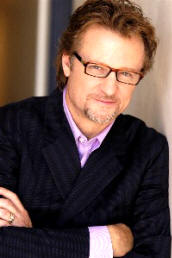SANTA MONICA, CA (ANS) — Following an appearance on CNN’s prime time evening program, Paula Zahn Now on Wednesday (May 17), where he talked about the storm of controversy over The Da Vinci Code and the debate over a potential boycott, Christian media leader Phil Cooke, has dropped a bombshell. Cooke told ANS that he is believes that the much of the American Church has become irrelevant in the modern world by "preaching to the choir" rather than transforming modern culture.
Cooke, the president and creative director for Cooke Pictures, a production company in Santa Monica, California, said, "Ask pastors and ministry leaders what they want to accomplish with their services, products or programs, and chances are, you’ll hear the words ‘be relevant.’ Relevance has become the buzzword – especially in the religious media world, and applies to media programming, books, sermons, and even churches themselves. Everyone wants to be relevant."
"I’ve spent my career helping the Church speak the language of the culture, and being contemporary and relevant is part of that equation. But I’ve discovered that most people work so hard to be relevant, they spin hopelessly into irrelevance. How?"
 Cooke went on to say that most Christian leaders mistake "relevant" for "trendy."
Cooke went on to say that most Christian leaders mistake "relevant" for "trendy."
He said, "They hope that if they wear the right clothes, use the right words, get just the right haircut, speak on current topics, or play the right music, they’ll somehow be perceived as relevant. But relevance isn’t about chasing trends, it’s about standing the test of time."
Cook cited the French philosopher and culture critic Simone Weil who said, "To be always relevant, you have to say things which are eternal."
Cooke then said, "Ultimate relevance is about the principles that last – eternal Truths with a capital ‘T’. That’s no excuse to wear tasteless clothes, sport bad haircuts, or use out of date terminology. (I’d personally feel I had done my job on the earth if we could rid Christian TV of fireplaces, plants, blue curtains, and tacky furniture). To speak in the living room of the culture, you must get them to open the door. No matter how brilliant your message, it doesn’t matter if no one listens. "But when they do listen, make sure you’re not trying to chase relevance. That’s a hopeless proposition, because what’s ‘relevant’ changes as styles, trends, and seasons change. What was wonderfully relevant last year, might simply get a laugh now.
"Instead, address what playwright Eugene O’Neill called ‘the eternal verities.’ The things that last, and are eternal. Pastors and ministry leaders have followed hot on the trail of motivation, self esteem, prosperity, faith teaching, positive thinking, and more in recent years – all of which have certainly been high on the relevance meter in their time.
"But while we were trying so hard to be relevant, guess what? A non-believer – Dan Brown – wrote a novel called The Da Vinci Code about the origins of Christianity that millions of people are reading. Sure the novel is ‘historical hooey’ as film star Tom Hanks has said, but the book’s success tells me that millions of people are asking serious questions about the beginnings of the faith, the divinity of Jesus, and the validity of believing in God.
"If you want to be remembered, and have your message mean as much to someone 100 years from now as it does at this moment, then reach for a higher goal. "Ultimately, to really be relevant, stop trying so hard to be relevant…"
Note: Phil Cooke is President & Creative Director of Cooke Pictures, based in Santa Monica, California. As a producer, media coach, and consultant, Phil works with many of the largest and most effective faith based organizations, and speaks at workshops, seminars, and conferences on a global basis. He’s considered an international expert on the subject of "change" and a regular contributor to major magazines. He’s most likely the only working producer in Hollywood with a Ph.D. in Theology, and his blog at www.philcooke.com is considered one of the most insightful resources on the web on issues of faith, culture, media, and the power of change.

